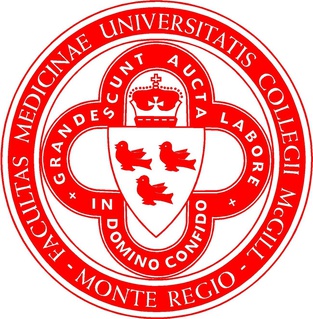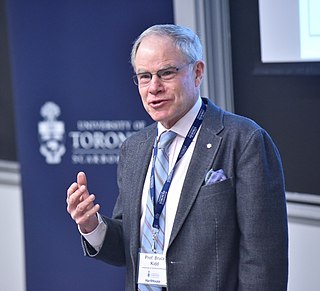Related Research Articles

The University of Prince Edward Island (UPEI) is a public university in Charlottetown, Prince Edward Island, Canada, and the only university in the province. Founded in 1969, the enabling legislation is the University Act, R.S.P.E.I 2000.
The University of Toronto Faculty of Law is the law school of the University of Toronto. Maclean's has consistently assessed the Faculty as the highest ranked common law school in Canada and the highest ranked in terms of faculty journal citations. The Faculty offers the JD, LLM, SJD, MSL, and GPLLM degrees in law.

John William Michael Bliss (1941–2017) was a Canadian historian and author. Though his early works focused on business and political history, he also wrote biographies of physicians Frederick Banting, William Osler and Harvey Cushing. Bliss was a frequent commentator on political events and issues. He was an Officer of the Order of Canada.

Dafydd Rhys "David" Williams is a Canadian physician, public speaker, author and retired CSA astronaut. Williams was a mission specialist on two Space Shuttle missions. His first spaceflight, STS-90 in 1998, was a 16-day mission aboard Space Shuttle Columbia dedicated to neuroscience research. His second flight, STS-118 in August 2007, was flown by Space Shuttle Endeavour to the International Space Station. During that mission he performed three spacewalks, becoming the third Canadian to perform a spacewalk and setting a Canadian record for total number of spacewalks. These spacewalks combined for a total duration of 17 hours and 47 minutes.

The Temerty Faculty of Medicine is the medical school of the University of Toronto. Founded in 1843, the faculty is based in Downtown Toronto and is one of Canada's oldest institutions of medical studies, being known for the discovery of insulin, stem cells and the site of the first single and double lung transplants in the world.
Liaison psychiatry, also known as consultative psychiatry or consultation-liaison psychiatry, is the branch of psychiatry that specialises in the interface between general medicine/pediatrics and psychiatry, usually taking place in a hospital or medical setting. The role of the consultation-liaison psychiatrist is to see patients with comorbid medical conditions at the request of the treating medical or surgical consultant or team. Consultation-liaison psychiatry has areas of overlap with other disciplines including psychosomatic medicine, health psychology and neuropsychiatry.

The Faculty of Medicine and Health Sciences is one of the constituent faculties of McGill University. It was established in 1829 after the Montreal Medical Institution was incorporated into McGill College as the college's first faculty; it was the first medical faculty to be established in Canada. The Faculty awarded McGill's first degree, and Canada's first medical degree to William Leslie Logie in 1833.

Bruce Kidd, is a Canadian academic, author, and athlete.
Nancy Coover Andreasen is an American neuroscientist and neuropsychiatrist. She currently holds the Andrew H. Woods Chair of Psychiatry at the Roy J. and Lucille A. Carver College of Medicine at the University of Iowa.
Edward Llewellyn-Thomas was an English scientist, university professor and, writing as Edward Llewellyn, a science fiction author. Llewellyn-Thomas published sixty scientific articles on psychology and eye movement over the course of his life. Active in the field of pharmacology, he took interest in the ethical development of biomedical science. His Douglas Convolution science fiction series concerns the breakdown of civilization after most of a generation is born sterile as a side effect of a widely used anti-cancer medication.
Maximilian Fink is an American neurologist and psychiatrist best known for his work on ECT. His early work also included studies on the effect of psychoactive drugs on brain electrical activity; his later work has included books about the syndromes of catatonia and melancholia, published in the 2010s.
Geriatric psychiatry, also known as geropsychiatry, psychogeriatrics or psychiatry of old age, is a branch of medicine and a subspecialty of psychiatry dealing with the study, prevention, and treatment of neurodegenerative, cognitive impairment, and mental disorders in people of old age. Geriatric psychiatry as a subspecialty has significant overlap with the specialties of geriatric medicine, behavioural neurology, neuropsychiatry, neurology, and general psychiatry. Geriatric psychiatry has become an official subspecialty of psychiatry with a defined curriculum of study and core competencies.
Adam Scott Radomsky is a Canadian psychologist who studies obsessive-compulsive disorder (OCD) and related anxiety disorders. He is a professor in the Department of Psychology at Concordia University in Montreal, Canada, and was editor-in-chief of the Journal of Behavior Therapy and Experimental Psychiatry.
Clarence Bynold Farrar, SM was an influential psychiatrist, the first Director of the Toronto Psychiatric Hospital, and editor of The American Journal of Psychiatry for 34 years.
Shitij Kapur is a medical doctor and administrator. He is has served as the 21st president and principal of King's College London since 1 June 2021. Previously, he was the dean of the Faculty of Medicine Dentistry and Health Sciences and assistant vice-chancellor (health) of the University of Melbourne from 2016 to 2020.
Hilary Patricia Blumberg is a medical doctor and the inaugural John and Hope Furth Professor of Psychiatry at the Yale School of Medicine. She is also a professor of Radiology and Biomedical Imaging, and works in the Child Study Center at Yale where she has been a faculty member since 1998. She attended Harvard University as an undergraduate, and completed medical school at Cornell University Medical College (1990). She completed her medical internship and psychiatry residency at Cornell University Medical College/New York Hospital, and her neuroimaging fellowship training at Cornell University, Weill Medical College. She has received the 2006 National Alliance for Research in Schizophrenia and Depression (NARSAD) and the Gerald L. Klerman Award for Clinical Research. Blumberg has authored a number of scientific articles that focus on bipolar disorder, neuroimaging, and effects of specific genetic variations, developmental trajectories and structure-function relationships.

Harvey Max Chochinov is a Canadian academic and psychiatrist from Winnipeg, Canada. He is a leading authority on the emotional dimensions of end-of-life, and on supportive and palliative care. He is a Distinguished Professor of Psychiatry at the University of Manitoba and a Senior Scientist at CancerCare Manitoba Research Institute.
Andrew T. Scull is a British-born sociologist who researches the social history of medicine and the history of psychiatry. He is a distinguished professor of sociology and science studies at University of California, San Diego, and recipient of the Roy Porter Medal for lifetime contributions to the history of medicine. His books include Madhouse: A Tragic Tale of Megalomania and Modern Medicine, Madness in Civilization: A Cultural History of Insanity, and Desperate Remedies: Psychiatry's Turbulent Quest to Cure Mental Illness.
Zack Zdenek Cernovsky was a Canadian psychologist. He was a professor of psychiatry in the Schulich School of Medicine & Dentistry at the University of Western Ontario. He was educated at the University of Berne and the University of Zurich, and taught overseas classes for the University of Maryland before joining the faculty of the University of Western Ontario. His more than 180 scientific publications in psychology and psychiatry deal with topics such as the MMPI, schizophrenia, psychological statistics and research design, sleep disorders, PTSD symptoms in refugees, the frequent psychological polytraumatic symptom pattern encountered in survivors of motor vehicle accidents, and assessments of subjective psychological symptoms of whiplash injury, as a part of medical psychology.
Eva Waddell Mader Macdonald was a Canadian medical professional at the Women's College Hospital. She began as a medical professor in hygiene before becoming the Director of Laboratories at WCH from 1945 to 1952. Outside of medicine, Macdonald was the chancellor of the University of Toronto from 1974 to 1977.
References
- ↑ "Edward Shorter CV" (PDF). 2015-11-19. Retrieved 2021-09-21.
- ↑ "Edward Shorter". Department of History. University of Toronto. 2019-11-06. Retrieved 2021-09-21.